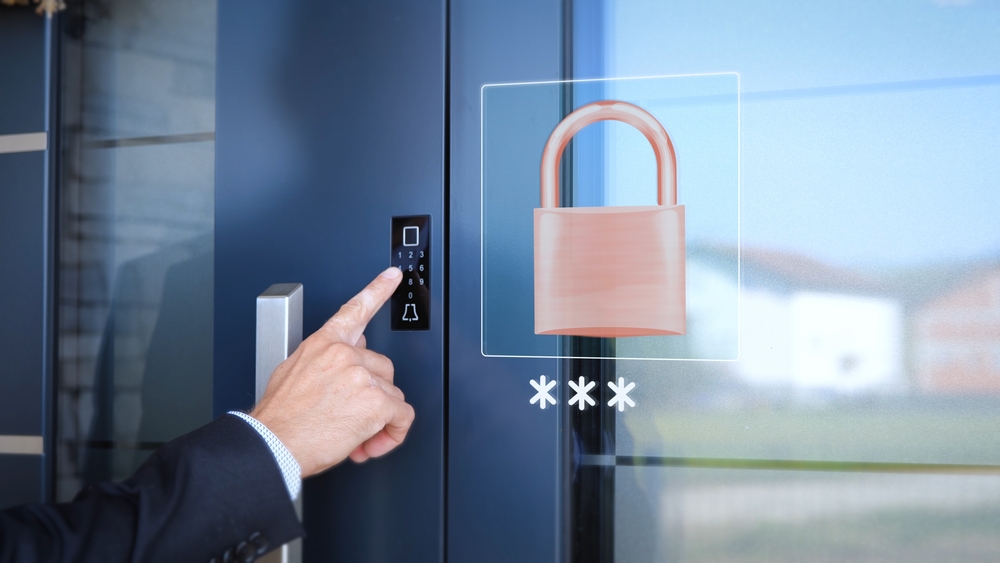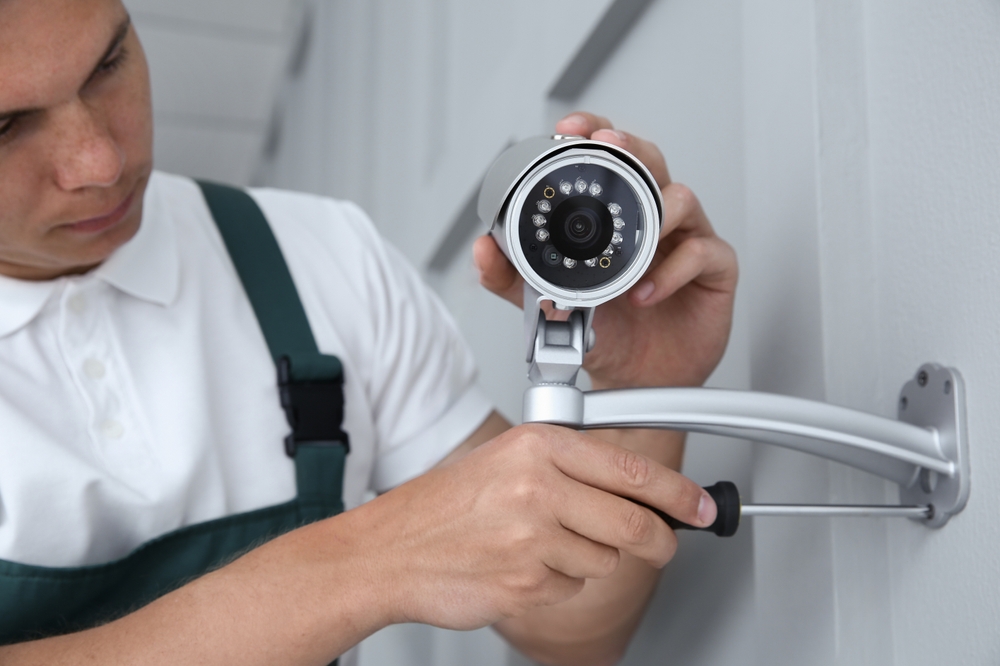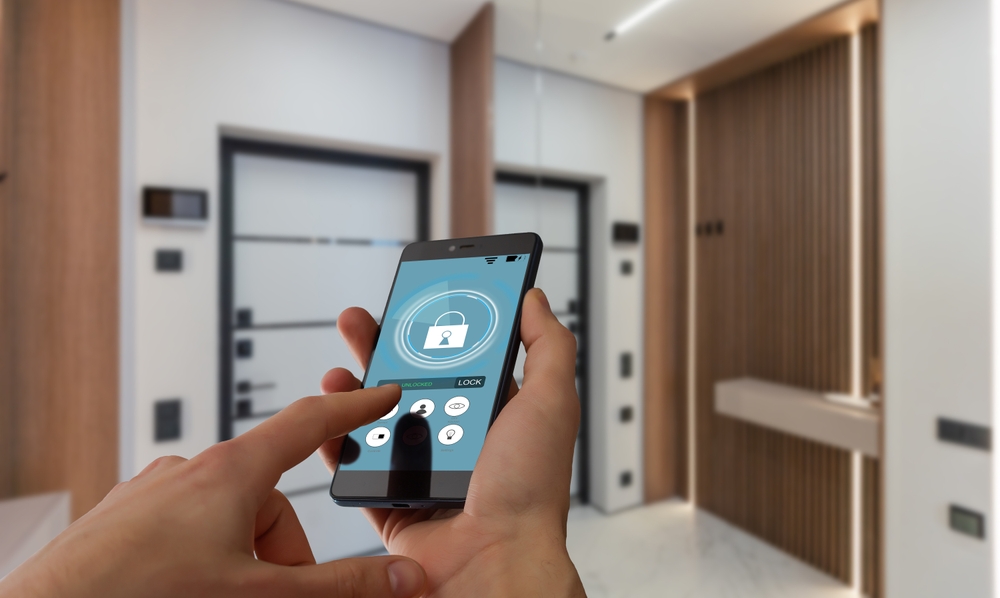In today’s world, home security has evolved into a comprehensive approach to protecting our living spaces, families, and valuables. Home security encompasses a wide range of measures, from traditional locks and alarms to cutting-edge smart systems.
These measures are designed to deter intruders and detect threats, ultimately providing tranquility for homeowners. The importance of robust home security systems cannot be overstated in today’s world.
As technology advances, so do the methods employed by those with malicious intent. A well-designed security system not only acts as a deterrent to potential burglars but also offers real-time monitoring and rapid response capabilities.
Moreover, modern systems integrate seamlessly with our digital lives. This allows homeowners to monitor their properties from anywhere in the world. In this article, we’ll explore the multifaceted world of home security, examining both time-tested methods and innovative solutions that are reshaping how we protect our most cherished spaces.

Types of Home Security Systems
Monitored systems
Professional monitoring
Professional monitoring involves a dedicated team watching your home 24/7. They respond to alerts from your security system. If an alarm is triggered, they contact you and dispatch emergency services if needed.
This service provides peace of mind and ensures someone is always watching your home. You don’t have to worry about missing an alert or being unavailable during an emergency.
However, professional monitoring comes at a cost. It usually requires a monthly subscription fee.
The response time can vary depending on the monitoring center’s location and workload. False alarms can be a concern, potentially leading to unnecessary police dispatches and potential fines. Some users may also have privacy concerns about constant monitoring of their property.
Self-monitoring
Self-monitoring systems send alerts directly to your smartphone or device. You’re responsible for checking alerts and contacting authorities if needed. This option gives you more control over your system.
Self-monitoring is often more affordable than professional services. There are typically no monthly fees and you can decide how to respond to each alert based on your judgment. The downside is the responsibility falls entirely on you. If you miss an alert, no one else will respond. This can be stressful, especially when you’re away or unreachable.
Unmonitored systems
Local alarms
Local alarms make loud noises when triggered, aiming to frighten intruders and alert neighbors. The blaring alarm acts as a potent deterrent, instantly drawing attention to your property. These systems are simple and don’t require ongoing fees.
They’re easy to install and operate. However, they rely on someone hearing and responding to the alarm. If the area’s deserted, their effectiveness plummets. Plus, you won’t get automatic notifications, nor will the authorities.
Smart home integration
Some unmonitored systems integrate with smart home devices. These devices can trigger lights, lock doors, or send notifications to your phone, adding an extra layer of functionality. These systems offer more control and customization.
You can create automated responses to different triggers. They often work with voice assistants for easy control. The downside is that they can be complex to set up and may require more technical knowledge. If not configured correctly, they may also cause false alarms.
Wireless systems
Wi-Fi based systems
Wi-Fi systems connect directly to your home network, providing alerts and remote access through the internet. These systems are user-friendly and easily expandable. They offer flexibility in device placement, allowing you to add or relocate sensors without complicated wiring.
Many Wi-Fi systems are compatible with other smart home devices, enhancing their functionality. However, it’s important to note that they depend on your internet connection. If your Wi-Fi service is interrupted, it will affect your security system. Additionally, proper security measures are crucial to protect against potential hacking attempts.
Cellular systems
Cellular systems use mobile networks to communicate, making them more reliable than Wi-Fi systems. They work even if your internet or power goes out and are harder to disable, as they don’t rely on physical wires that can be cut. Many offer backup battery power for added reliability.
The downside is they often require a monthly fee for cellular service. Signal strength can be an issue in some areas, and they may not work well in remote locations with poor cell coverage.
Wired systems
Hardwired systems
Hardwired systems connect directly to your home’s electrical system, offering high reliability without the need for battery changes. Often favored in new construction, these systems are difficult to disable by simply cutting wires. Many include backup battery power, adding an extra layer of security.
Their robust design makes them less susceptible to tampering by intruders. However, the main drawback is the complex installation process, which typically requires professional assistance. Modifying or expanding the system can be challenging and costly.
Power line systems
Power line systems cleverly use your home’s existing electrical wiring to transmit signals. This approach blends the reliability of wired systems with the convenience of wireless ones. Installation is more straightforward than hardwired systems, as no new wiring is needed.
These systems often prove more dependable than purely wireless options. However, they’re not without drawbacks. Electrical interference can impact performance, and some older homes may not be compatible. For the best results, professional installation is often recommended.
DIY home security systems
All-in-one kits
All-in-one kits come with everything needed for basic home security, usually including a control panel, sensors, and cameras. These user-friendly kits are designed for easy self-installation, often more affordable, and can be set up without professional help. Many offer customization options to fit your specific needs.
The downside is they may have limited features compared to professional systems. Expandability can be limited to the manufacturer’s devices, and technical support may be less comprehensive.
Custom DIY setups
Custom DIY setups allow you to mix and match components from different manufacturers, offering more flexibility and customization. You can tailor the system to your exact needs, often more cost-effectively than pre-packaged solutions. Components can be added or upgraded as needed.
However, this approach requires more research and technical knowledge and ensuring all components work together can be challenging. Also, troubleshooting may be more difficult without a single point of support.

Choosing the Right Home Security System
Assessing your needs
When selecting a home security system, it’s crucial to start by evaluating your specific requirements. Consider the size and layout of your home, including the number of entry points and areas that need protection.
Your budget plays a significant role, encompassing both initial costs and ongoing expenses like monitoring fees or maintenance. Don’t forget to factor in potential insurance discounts that may offset some costs.
Think about the features you desire, such as live video streaming, smartphone controls, or smart home integration. It’s wise to consider future needs as well, opting for a system that can grow with you. The goal is to find a balance between comprehensive protection and a system you’re comfortable using.
System components
A robust home security system typically consists of several key components. Security cameras are essential for monitoring entry points and high-traffic areas, with options ranging from basic models to advanced units with night vision and two-way audio.
Sensors and detectors form the backbone of the system, alerting you to opened doors or windows and detecting motion within your home. Environmental sensors like smoke and carbon monoxide detectors add an extra layer of safety.
The control panel serves as the brain of the system, allowing you to arm, disarm, and monitor your security setup. When choosing components, consider factors like video storage options, sensor sensitivity, and the user-friendliness of the control interface.
Monitoring options
The choice between professional monitoring and self-monitoring is a crucial decision in setting up your home security system. Professional monitoring offers round-the-clock protection with trained staff ready to respond to alerts and contact emergency services if needed. While it provides tranquility, it typically comes with monthly fees.
Self-monitoring, on the other hand, puts you in charge of responding to alerts sent directly to your smartphone. This option is often more affordable but requires you to be available and responsive.
Some systems offer hybrid options, combining elements of both professional and self-monitoring for a balance of security and cost-effectiveness. Your choice should depend on your lifestyle, budget, and comfort level with handling potential security incidents.
Process of Home Security Installation
Initial consultation and assessment
On-site evaluation
The journey to a secure home begins with a thorough consultation and assessment. A security expert visits your property to evaluate its layout and identify potential vulnerabilities in doors, windows, and other entry points.
They consider your neighborhood’s security situation, including crime rates and common threats, to tailor a system that addresses specific local concerns. The expert also assesses outdoor spaces like garages and yards to ensure comprehensive protection.
Personalized planning
During this phase, you’ll discuss your security concerns, daily routines, and budget considerations. This information helps the expert recommend a system that balances your security needs with your lifestyle and financial constraints.
The outcome is a detailed proposal, including recommended components and a clear breakdown of costs for equipment, installation, and any ongoing fees.
Choosing the right system components
Core security elements
Selecting appropriate components is important for an effective security system. The control panel, acting as the system’s brain, should be user-friendly and strategically placed for easy access while remaining hidden from outside view.
Sensors form the backbone of the system, with door and window sensors being essential. Motion detectors can cover larger areas, and environmental sensors like smoke and carbon monoxide detectors add an extra layer of safety.
Visual monitoring and data storage
Camera selection involves choosing between indoor, outdoor, and doorbell cameras. This decision considers factors such as resolution and field of view. Special features like night vision or two-way audio are also important considerations.
Storage options for footage, either cloud-based or local, should also be considered. The goal is to create a comprehensive system that addresses all aspects of home security.

Installation process
The installation phase can be professional or DIY, depending on the system chosen and your comfort level. Professional installation typically involves technicians visiting your home, and bringing all necessary equipment and tools. They strategically place sensors, mount cameras, and connect the system to your home’s power supply, ensuring everything is properly aligned and functioning.
For those opting for DIY installation, systems come with detailed instructions and often online video guides. This involves placing sensors, mounting cameras, and connecting the system to your home’s Wi-Fi network. Whether professional or DIY, considerations must be made for wiring and power. This includes evaluating the potential need for backup power options to ensure continuous operation during outages.
Setting up monitoring and control systems
Once installed, the system needs to be configured for optimal performance. This includes programming the control panel with user codes, setting up zone programming to identify sensor locations, and configuring alert methods. If professional monitoring is chosen, the system must be connected to the monitoring center, and emergency contact information provided.
Understanding the monitoring company’s procedures is crucial for knowing what to expect in an emergency. Many modern systems offer smartphone apps for remote control and monitoring. Setting these up involves downloading the app, creating an account, and configuring preferences for notifications and alerts. Testing remote access features ensures you can control your system from anywhere.
Testing and adjusting the system
The final phase involves thoroughly testing and fine-tuning the system. An initial system test triggers each sensor and camera to verify that the control panel receives all signals correctly. If professional monitoring is used, they should be involved in this test to confirm proper alert reception and response procedures.
Sensor sensitivity may need to be adjusted to prevent false alarms while ensuring all genuine threats are detected. Camera settings might require tweaking for optimal coverage. Environmental sensors should be tested and properly placed.
User training is crucial, ensuring all family members understand how to operate the system. Creating a quick reference guide for basic operations and keeping all system documentation organized completes the installation process. This leaves you with a fully functional and personalized home security system.
Choosing a Home Security Company
Selecting the right home security company is essential for your peace of mind and safety. Several factors come into play when making this important decision. Let’s explore these key considerations to help you make an informed choice.

Factors to consider
Licensing and certification
A reputable home security company should have proper licensing and certification. These credentials demonstrate compliance with industry standards and regulations. Check if the company is licensed to operate in your area. Look for certifications from recognized industry bodies.
Experience and expertise
Experience matters in the security industry. Companies with a long track record often have refined processes and better understanding of various security challenges. Consider how long the company has been in business. Inquire about their expertise in handling different types of security systems and situations.
Response time and availability
In emergencies, every second counts. A reliable security company should offer quick response times and 24/7 availability. Ask about their average response time to alarms. Ensure they have a dedicated monitoring center that operates round the clock.
Reviews and testimonials
Customer feedback can provide valuable insights into a company’s performance. Look for reviews on independent platforms and industry-specific forums. Pay attention to both positive and negative feedback. Consider reaching out to current clients for their honest opinions if possible.
Insurance coverage
A professional security company should carry adequate insurance. This protects you from liability in case of accidents during installation or monitoring. Ask about their insurance coverage and request proof if necessary. Ensure their policy covers potential damages to your property.
Technology and equipment used
The quality of security equipment can make a significant difference in your home’s protection. Inquire about the brands and types of equipment the company uses. Ask if they offer the latest technologies like smart home integration or mobile app controls. Ensure their equipment is up-to-date and reliable.
Questions to ask potential companies
When interviewing security companies, asking the right questions can help you gauge their suitability. Here are some important queries to consider:
- What is your response protocol in case of an alarm?
- Do you offer professional installation, or is it DIY?
- What are your contract terms and cancellation policies?
- How often do you update your technology and equipment?
- Can you provide a detailed breakdown of all costs involved?
Don’t hesitate to ask for clarification on any aspect of their service. A reputable company will be transparent and willing to address all your concerns. Remember, choosing a home security company is a significant decision. Take your time to research and compare different options.
DIY vs. Professional Home Security Installation
When considering home security installation, homeowners must weigh the pros and cons of DIY versus professional options. DIY systems can be suitable for those with basic security needs, small living spaces, or tech-savvy individuals who enjoy hands-on projects. They offer flexibility and potential cost savings.
However, professional installation provides expert system design, reliable setup, and comprehensive coverage. Professionals can identify vulnerabilities, ensure proper placement of devices, and offer ongoing support. DIY efforts may lead to installation errors, limited system capabilities, and a lack of expert assistance.
While DIY can work for simple setups, professional installation is often better for complex systems or whole-home coverage. Ultimately, the choice depends on the homeowner’s technical skills, security requirements, and desire for peace of mind.
Cost Considerations and Budgeting
When budgeting for a home security system, it’s essential to consider all cost aspects, including equipment, installation, and ongoing monitoring fees. To stay within budget, prioritize your security needs, compare quotes from multiple providers, and consider long-term costs.
Financing options like payment plans or rent-to-own programs can make upfront expenses more manageable. Don’t overlook potential savings through insurance discounts or tax benefits for certain security investments. Create a contingency fund for unexpected expenses and understand your warranty coverage.
Service agreements might offer cost-effective maintenance solutions. By breaking down costs and exploring financing options, homeowners can make informed decisions. Planning for contingencies also helps balance their security needs with financial constraints.
Remember to factor in both immediate and long-term expenses to get a complete picture of your security investment.
Maintaining Your Home Security System
Home security system maintenance is crucial for optimal protection. Check sensors, cameras, and entry points weekly and perform monthly full system tests. Keep software updated and follow seasonal checklists to address weather-related concerns.
Spring and summer focus on outdoor components, while fall and winter preparations ensure functionality in colder months. Watch for signs that professional attention is needed, such as frequent false alarms, connectivity issues, outdated technology, or unusual battery drain.
These may indicate underlying problems requiring expert diagnosis and repair. By following these guidelines, you can ensure your home security system remains effective year-round, providing calmness and protection for your property and loved ones.
Sustainable and Eco-Friendly Security Options
Energy-efficient devices
Sustainable and eco-friendly security options offer numerous benefits for homeowners and the environment. Energy-efficient devices like solar-powered cameras, LED motion sensor lights, and smart thermostats reduce electricity consumption and waste.
Eco-friendly monitoring options, including cloud-based surveillance systems and low-power wireless sensors, minimize electronic waste and energy use. Smart home integration further enhances efficiency by automating security features and energy management.
Environmental and economic benefits
Green solutions not only reduce your carbon footprint but also provide long-term cost savings through lower energy bills and reduced maintenance needs. Additionally, they often offer improved reliability with advanced technology and longer lifespans.
By choosing sustainable security options, homeowners can protect their property while contributing to environmental conservation and setting a positive example for their community.
Common Challenges in Home Security
System reliability and disruptions
Home security systems face common challenges that homeowners should be prepared to address. Unexpected issues like power outages, weather-related problems, and technological glitches can disrupt system functionality.
Proper installation and operation are crucial, whether choosing a DIY or professional setup. Regular testing helps maintain effectiveness. User error is a significant concern, so thorough training for all household members is essential.
Managing false alarms
Managing false alarms is another key challenge, often triggered by pets, loose entry points, or HVAC systems. Reducing false alarm frequency through regular maintenance, user education, and possibly upgrading to newer technology can help avoid fines and unnecessary emergency responses.
By understanding these challenges and taking proactive steps to address them, homeowners can ensure their security systems provide reliable protection and comfort.
Trends in Home Security Technology
Advanced detection and surveillance
Home security technology is rapidly evolving, offering innovative solutions for homeowners. Current trends include AI and machine learning for improved threat detection, facial recognition for personalized access control, and even drone surveillance for large properties.
Smart home integration is increasingly popular, with voice-controlled systems, automated routines, and integration with smart appliances enhancing both security and convenience.
Smart devices and future innovations
Popular devices like video doorbells and smart locks provide remote monitoring and keyless entry options. Environmental sensors offer comprehensive protection against various threats. These advancements not only improve security but also contribute to overall home automation and safety.
As technology continues to progress, homeowners can expect even more sophisticated and user-friendly security options. This makes it easier than ever to protect their properties and loved ones.

Frequently Asked Questions
How long does it take for a security company to respond to an alarm?
Response times vary by company, but most reputable security firms aim to respond within 30 seconds to two minutes of receiving an alarm signal. However, actual police or emergency service dispatch times may be longer, depending on local resources and protocols.
It’s important to discuss response times with potential security providers before signing up. Ask about their average response times and what factors might affect them in your specific area.
Can I install a home security system if I’m renting?
Yes, you can install a home security system in a rental property. Many companies offer wireless systems that don’t require permanent modifications. However, it’s important to check your lease agreement and get your landlord’s permission before installation. Some landlords may even welcome the added security.
Consider opting for a portable system that you can easily take with you when you move. This allows you to maintain consistent security across different rental properties without significant reinstallation costs.
What happens to my home security system during a power outage?
Most modern home security systems have battery backups that keep them operational during power outages. These batteries typically last between eight to 24 hours, depending on the system. Additionally, many systems can send notifications to your phone about power loss and when power is restored.
For extended power outages, consider having a backup power source like a generator. Some advanced systems can also connect to your mobile’s Wi-Fi network, allowing them to continue communicating even when landlines are down.
Is it true that home security systems are only for wealthy homeowners?
No, this is a common misconception. Home security systems are available for a wide range of budgets and home types. Many companies offer affordable options with flexible pricing plans, including DIY systems with low monthly monitoring fees.
Moreover, advances in technology have made basic security features more accessible. Even renters and those on tight budgets can find suitable options, from simple door sensors to comprehensive smart home security systems.
Do home security systems always require professional installation?
No, professional installation is not always necessary for home security systems. While some complex systems benefit from expert setups, many modern security systems are designed for easy DIY installation.
Wireless and smart home security systems, in particular, often come with user-friendly instructions and intuitive apps for setup. However, if you’re not comfortable with technology or have a large property, professional installation might still be the best choice for optimal performance and serenity.
Locations
California
- Los Angeles
- San Diego
- San Jose
- San Francisco
- Fresno
- Sacramento
- Long Beach
- Oakland
- Bakersfield
- Anaheim
- Santa Ana
- Riverside
- Stockton
- Chula Vista
- Irvine
- Fremont
- San Bernardino
- Modesto
- Fontana
- Oxnard
- Moreno Valley
- Glendale
- Huntington Beach
- Santa Clarita
- Oceanside
- Garden Grove
- Rancho Cucamonga
- Santa Rosa
- Ontario
- Elk Grove
- Corona
- Lancaster
- Palmdale
- Hayward
- Salinas
- Pomona
- Sunnyvale
- Escondido
- Torrance
- Pasadena
- Fullerton
- Orange
- Roseville
- Visalia
- Thousand Oaks
- Concord
- Simi Valley
- Santa Clara
- Victorville
- Vallejo
- Berkeley
- El Monte
- Downey
- Costa Mesa
- Inglewood
- Carlsbad
- Fairfield
- Ventura
- Temecula
- Antioch
- Richmond
- West Covina
- Murrieta
- Norwalk
- Daly City
- Burbank
- Santa Maria
- El Cajon
- San Mateo
- Rialto
- Clovis
- Jurupa Valley
- Compton
- Vista
- Mission Viejo
- South Gate
- Vacaville
- Carson
- Hesperia
- Santa Monica
- Westminster
- Redding
- Santa Barbara
- Chico
- Newport Beach
- San Leandro
- Indio
- Tracy
- Livermore
- Baldwin Park
- Merced
- Chino
- Redwood City
- Lake Forest
- Napa
- Tustin
- Buena Park
- Mountain View
- Lakewood
- San Marcos
Texas
- Houston
- San Antonio
- Dallas
- Austin
- Fort Worth
- El Paso
- Arlington
- Corpus Christi
- Plano
- Laredo
- Lubbock
- Garland
- Irving
- Amarillo
- Grand Prairie
- Brownsville
- McKinney
- Frisco
- Pasadena
- Mesquite
- Killeen
- Carrollton
- Midland
- Waco
- Denton
- Abilene
- Odessa
- Beaumont
- Round Rock
- Richardson
- Pearland
- College Station
- Tyler
- League City
- Wichita Falls
- Allen
- San Angelo
- Edinburg
- Sugar Land
- Mission
- Conroe
- Bryan
- New Braunfels
- Pharr
Florida
- Jacksonville
- Miami
- Tampa
- Orlando
- St. Petersburg
- Hialeah
- Tallahassee
- Port St. Lucie
- Cape Coral
- Fort Lauderdale
- Pembroke Pines
- Hollywood
- Miramar
- Gainesville
- Coral Springs
- Clearwater
- Miami Gardens
- Palm Bay
- Pompano Beach
- West Palm Beach
- Lakeland
- Davie
- Miami Beach
- Plantation
- Sunrise
- Boca Raton
- Deltona
- Palm Coast
- Largo
- Melbourne
New York
- New York City
- Buffalo
- Rochester
- Yonkers
- Syracuse
- Albany
- New Rochelle
- Mount Vernon
- Schenectady
- Utica
- White Plains
- Hempstead
- Troy
- Niagara Falls
- Binghamton
- Freeport
- Valley Stream
- Long Beach
- Rome
- North Tonawanda
Pennsylvania
- Philadelphia
- Pittsburgh
- Allentown
- Erie
- Reading
- Scranton
- Bethlehem
- Lancaster
- Harrisburg
- Altoona
Illionois
- Chicago
- Aurora
- Rockford
- Joliet
- Naperville
- Springfield
- Peoria
- Elgin
- Waukegan
- Champaign
- Bloomington
- Decatur
- Evanston
- Des Plaines
- Berwyn
- Wheaton
- Belleville
Ohio
- Columbus
- Cleveland
- Cincinnati
- Toledo
- Akron
- Dayton
Georgia
- Atlanta
- Augusta
- Columbus
- Savannah
- Athens
North Carolina
- Charlotte
- Raleigh
- Greensboro
- Durham
- Winston-Salem
- Fayetteville
- Cary
- Wilmington
- High Point
Michigan
- Detroit
- Grand Rapids
- Warren
- Sterling Heights
- Ann Arbor
- Lansing
- Flint
- Dearborn
- Livonia
- Troy
New Jersey
- Newark
- Jersey City
- Paterson
- Elizabeth
- Edison
- Woodbridge
- Lakewood
- Toms River
- Hamilton
- Trenton
Virginia
- Virginia Beach
- Norfolk
- Chesapeake
- Richmond
- Newport News
- Alexandria
- Hampton
- Roanoke
- Portsmouth
- Suffolk
Washington
- Seattle
- Spokane
- Tacoma
- Vancouver
- Bellevue
- Kent
- Everett
- Renton
- Federal Way
- Yakima
Massachusetts
- Boston
- Worcester
- Springfield
- Lowell
- Cambridge
- New Bedford
- Brockton
- Quincy
- Lynn
- Fall River
Arizona
- Phoenix
- Tucson
- Mesa
- Chandler
- Glendale
- Scottsdale
- Gilbert
- Tempe
- Peoria
- Surprise
Tennessee
- Nashville
- Memphis
- Knoxville
- Chattanooga
- Clarksville
- Murfreesboro
- Franklin
- Jackson
- Johnson City
- Bartlett
Indiana
- Indianapolis
- Fort Wayne
- Evansville
- South Bend
- Carmel
- Fishers
- Bloomington
- Hammond
- Gary
- Lafayette
Missouri
- Kansas City
- St. Louis
- Springfield
- Columbia
- Independence
- Lee’s Summit
- O’Fallon
- St. Joseph
- St. Charles
- St. Peters
Maryland
- Baltimore
- Columbia
- Germantown
- Silver Spring
- Waldorf
- Glen Burnie
- Ellicott City
- Frederick
- Dundalk
- Rockville
Wisconsin
- Milwaukee
- Madison
- Green Bay
- Kenosha
- Racine
- Appleton
- Waukesha
- Oshkosh
- Eau Claire
- Janesville
Colorado
- Denver
- Colorado Springs
- Aurora
- Fort Collins
- Lakewood
- Thornton
- Arvada
- Westminster
- Pueblo
- Centennial
Minnesota
- Minneapolis
- St. Paul
- Rochester
- Duluth
- Bloomington
- Brooklyn Park
- Plymouth
- St. Cloud
- Eagan
- Woodbury
South Carolina
- Columbia
- Charleston
- North Charleston
- Mount Pleasant
- Rock Hill
- Greenville
- Summerville
- Sumter
- Goose Creek
- Hilton Head Island
Alabama
- Birmingham
- Montgomery
- Mobile
- Huntsville
- Tuscaloosa
Louisiana
- New Orleans
- Baton Rouge
- Shreveport
- Lafayette
- Lake Charles
Kentucky
- Louisville
- Lexington
- Bowling Green
- Owensboro
- Covington
Oregon
- Portland
- Salem
- Eugene
- Gresham
- Hillsboro
Oklahoma
- Oklahoma City
- Tulsa
- Norman
- Broken Arrow
- Edmond
Connecticut
- Bridgeport
- New Haven
- Stamford
- Hartford
- Waterbury
Iowa
- Des Moines
- Cedar Rapids
- Davenport
- Sioux City
- Iowa City
Mississippi
- Jackson
- Gulfport
- Southaven
- Hattiesburg
- Biloxi
Arkansas
- Little Rock
- Fort Smith
- Fayetteville
- Springdale
- Jonesboro
Utah
- Salt Lake City
- West Valley City
- Provo
- West Jordan
- Orem
Nevada
- Las Vegas
- Henderson
- Reno
- North Las Vegas
- Sparks
Kansas
- Wichita
- Overland Park
- Kansas City
- Olathe
- Topeka
New Mexico
- Albuquerque
- Las Cruces
- Rio Rancho
- Santa Fe
- Roswell
Nebraska
- Omaha
- Lincoln
- Bellevue
- Grand Island
- Kearney
West Virginia
- Charleston
- Huntington
- Parkersburg
- Morgantown
- Wheeling
Idaho
- Boise
- Meridian
- Nampa
- Idaho Falls
- Pocatello
Hawaii
- Honolulu
- Pearl City
- Hilo
- Kailua
- Waipahu
Maine
- Portland
- Lewiston
- Bangor
- South Portland
- Auburn
New Hampshire
- Manchester
- Nashua
- Concord
- Derry
- Dover
Rhode Island
- Providence
- Warwick
- Cranston
- Pawtucket
- East Providence
Montana
- Billings
- Missoula
- Great Falls
- Bozeman
- Butte
Delaware
- Wilmington
- Dover
- Newark
- Middletown
- Smyrna
South Dakota
- Sioux Falls
- Rapid City
- Aberdeen
- Brookings
- Watertown
North Dakota
- Fargo
- Bismarck
- Grand Forks
- Minot
- West Fargo
Alaska
- Anchorage
- Fairbanks
Vermont
- Burlington
- South Burlington
Wyoming
- Cheyenne
- Casper
